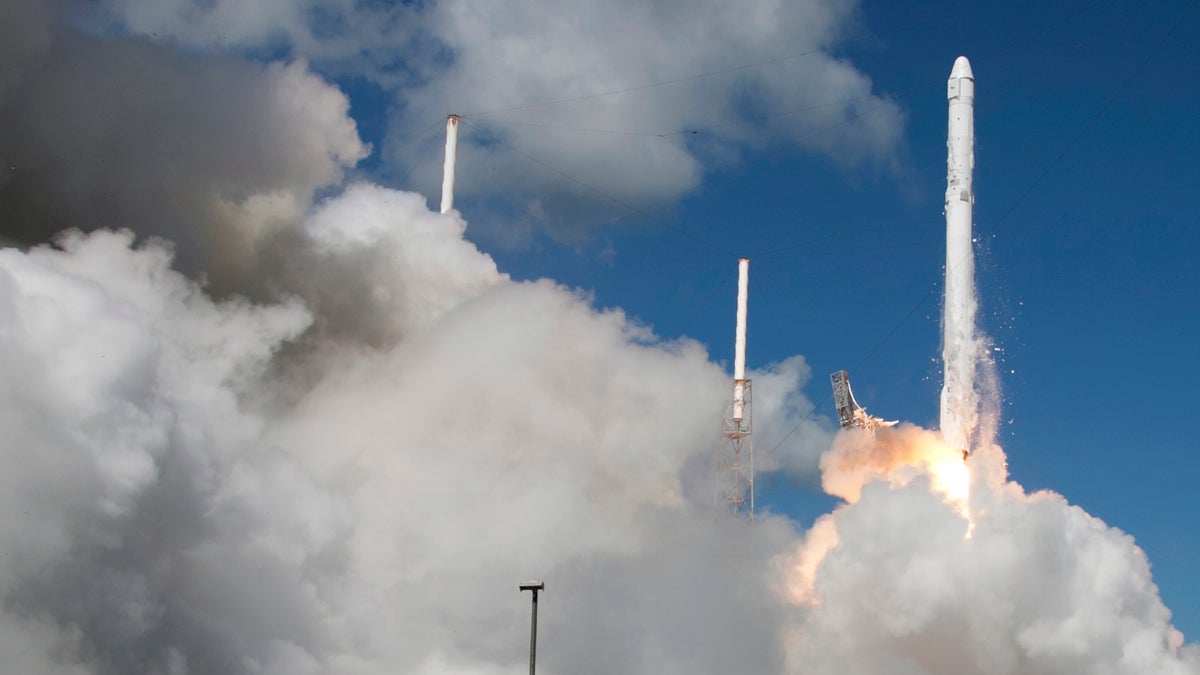Failed SpaceX flight claims student experiments from Del., NJ
Listen
The SpaceX Falcon 9 rocket and Dragon spacecraft lifts off from Space Launch Complex 40 at the Cape Canaveral Air Force Station in Cape Canaveral, Fla., Sunday, June 28, 2015. The rocket carrying supplies to the International Space Station broke apart shortly after liftoff. (John Raoux/AP Photo)
For the second time in eight months, a payload of student science experiments destined for the International Space Station has gone up in flames, this time including contributions from Phifer Middle School in Pennsauken, New Jersey and Caravel Academy in Bear, Delaware.
Kaelyn Connor, a rising junior at Caravel, said she had been excited to watch the SpaceX launch on her phone on Sunday. For two minutes, everything looked good. Then the Falcon 9 rocket disintegrated.
“I was so upset, I wanted to cry,” Connor said. “I didn’t even know what to say.”
Kelly Pyle, the only Caravel student who witnessed the launch live from Kennedy Space Center in Florida, said she only realized the mission had failed when word came over the loudspeaker. Then her father pulled up a news report.
“I was kind of shocked and kind of numb, because one minute everything was fine — my experiment was going to the International Space Station,” she said. “And suddenly it was just gone. There was no trace of it.”
Given previous struggles with launches, Caravel’s facilitating science teacher Meredith Swartzendruber said she had discussed the possibility of an explosion with her students, although it still came as a surprise. “It is real spaceflight, and there are going to be hiccups,” she said. “It’s still very difficult for us to launch out of Earth’s gravity. I think it was a good lesson for the students to know it’s not perfect.”
Together with three other high schoolers, Kaelyn and Kelly worked for months designing an experiment to test the effects of microgravity on fruit flies. Can the insects reproduce in space, and if so, can those offspring survive back on Earth? The team was prepared to complete control experiments this summer, but those have now been called off.
The eighth graders in Pennsauken tackled a different astrobiology question, investigating whether Staphylococcus bacteria are more susceptible to antibiotics in space.
The creator and director of the Student Spaceflight Experiments Program, Jeff Goldstein, said despite the disappointment, the incident offers a valuable teaching moment.
“I think that the message that we’re trying to get across to these students is that failure happens,” he said. “And what we do in the face of failure defines who we are. And that’s not just about rockets exploding and losing experiments.”
All 25 groups, he said, will get a chance to reassemble their experiments and launch them again, although no date has been set for that flight.
Ocean City High School also had its work destroyed in October when an Orbital Sciences rocket exploded. By January, though, a new experiment was in space, having safely been carried by a SpaceX Falcon 9 rocket.
WHYY is your source for fact-based, in-depth journalism and information. As a nonprofit organization, we rely on financial support from readers like you. Please give today.

